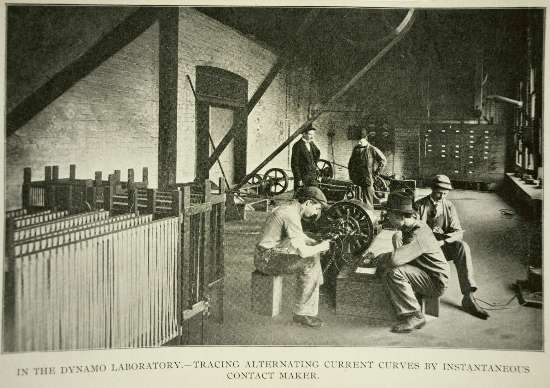 |
gtanno189899-55
Location:
T171 .G42 G49x 1888-1899
Title: Date:
In the dynamo laboratory
1899?
Content:
Students working in the dynamo laboratory. Alternate title reads: Tracing Alternating current curves by
instantaneous contact maker.
History:
From the Georgia School of Technology Announcement of 1898-99: "In Electrical Engineering, eight hours per
week will be given to the theory, design and construction of direct-current dynamos and motors, of the
alternator both single and multiphase, of the static and rotary transformer, and of the induction motor;
and in addition, a study will be made of the problems occurring in lighting and power-transmission.
Beginning in November, this work will be supplemented by six hours per week in the Electrical Engineering
laboratory. This course includes the calibration of measuring instruments, testing of arc-lamps,
photometric study of incandescent-lamps, various capacity tests by aid of standard condenser, over twenty
experiments on the testing and manipulation of direct-current dynamo machinery and about the same number on
alternating-current machinery. The equipment of the dynamo laboratory includes the following apparatus,
and additions to it will constantly be made: A 17 1/2 -kilowatt multipolar direct-current generator; a
10-kilowatt multipolar, direct-current generator, provided with rings for polyphase current and used as a
rotary converter; a 5-kilowatt 110-volt shunt generator; a five horse-power 110-volt series motor; an eight
horse-power multipolar differential motor; a 9-light Thomson-Houston arc-light generator, with automatic
regulator; a 5-kilowatt 220-volt three-phase alternator; a five horse-power three-phase induction motor; a
Schaeffer and Budenberg portable tachometer; an instantaneous contact-maker; some small generators; two
3-kilowatt transformers, applicable to phase transformation, and a storage battery of 300 cells. Among the
electrical measuring instruments are: a 150-volt double-scale Weston alternating and direct-current
voltmeter; a 150-volt double-scale, direct-current Weston voltmeter; a 600-volt, double-scale,
direct-current Weston voltmeter; a 150-ampere direct-current Weston ammeter; a 600-milliampere Weston
milliammeter; a 5-ampere Weston ammeter; 100-ampere Kelvin balance; a Siemens electro-dyamometer; several
swithboard ammeters and voltmeters; a wattmeter for direct and alternating currents, and a 10-M.F.
adjustable condenser."